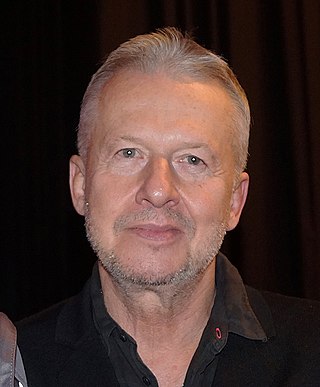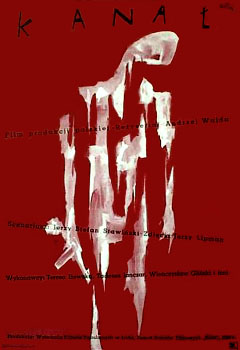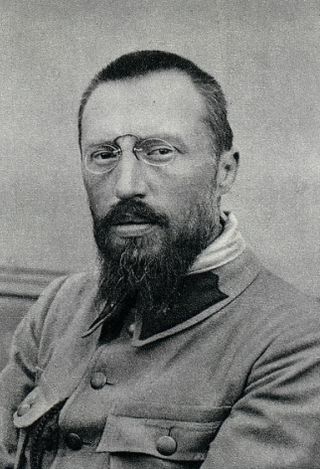
Andrzej Żuławski was a Polish film director and writer best known for his 1981 film Possession. Żuławski often went against mainstream commercialism in his films, and enjoyed success mostly with European art-house audiences.

Bogusław Linda is a Polish actor known from films such as Psy and Tato. He appeared in Andrzej Wajda's Man of Iron and Danton and in Krzysztof Kieślowski's Blind Chance and the seventh episode of Kieślowski's Dekalog. He is regarded as one of the most popular Polish film actors.

Kanał is a 1957 Polish film directed by Andrzej Wajda. It was the first film made about the 1944 Warsaw Uprising, telling the story of a company of Home Army resistance fighters escaping the Nazi onslaught through the city's sewers. The film is adapted from the story “They Loved Life” by Jerzy Stefan Stawinski. Kanał is the second film of Wajda's War Trilogy, preceded by A Generation and followed by Ashes and Diamonds.

The Pianist is a 2002 biographical film produced and directed by Roman Polanski, with a script by Ronald Harwood, and starring Adrien Brody. It is based on the autobiographical book The Pianist (1946), a memoir by the Polish-Jewish pianist, composer and Holocaust survivor Władysław Szpilman. The film was a co-production by France, the United Kingdom, Germany and Poland.

Andrzej Trzaskowski was a Polish jazz composer and musicologist. From the mid-1950s onward, he was regarded as an authority on syncopated music.

Possession is a 1981 psychological horror drama film directed by Andrzej Żuławski and written by Żuławski and Frederic Tuten. The plot obliquely follows the relationship between an international spy and his wife, who begins exhibiting increasingly disturbing behavior after asking for a divorce.

Jerzy Żuławski was a Polish literary figure, philosopher, translator, alpinist and patriot whose best-known work is the science-fiction epic, Trylogia Księżycowa, written between 1901 and 1911.

Blind Chance is a Polish film written and directed by Krzysztof Kieślowski and starring Bogusław Linda. The film presents three separate storylines, told in succession, about a man running after a train and how such an ordinary incident could influence the rest of the man's life. Originally completed in 1981, Blind Chance was suppressed by the Polish authorities for several years until its delayed release in Poland on 10 January 1987 in a censored form.

Xawery Żuławski is a Polish film director.

Innocent Sorcerers is a 1960 Polish psychological romantic drama film directed by Andrzej Wajda, and starring Tadeusz Łomnicki and Krystyna Stypułkowska. Its plot follows a young womanizer meeting another yet finally interesting girl, who all but forces herself into his apartment where they play the game of appearances, unable to confess their love to each other.

Manuela Gretkowska is a Polish writer, screenwriter, feminist and politician. She is the foundress of the Feminist Initiative.

On the Silver Globe is a 1988 Polish epic science fiction film directed and written by Andrzej Żuławski, adapted from The Lunar Trilogy by his grand-uncle, Jerzy Żuławski. Starring Andrzej Seweryn, Jerzy Trela, Iwona Bielska, Jan Frycz, Henryk Bista, Grażyna Deląg and Krystyna Janda, the plot follows a team of astronauts who land on an uninhabited planet and form a society. Many years later, a single astronaut is sent to the planet and becomes a messiah.

Sir Thaddeus, or the Last Lithuanian Foray, also simply known as Sir Thaddeus, is a 1999 Polish film directed by Andrzej Wajda. It is based on the 1834 eponymous epic poem by Polish poet, writer and philosopher Adam Mickiewicz (1798–1855). As in the poem, conflict between the Soplica and Horeszko families serves as a backdrop for discussion of issues of Polish national unity and the struggle for independence.
Institute of Philosophy of the University of Warsaw is a research institution located in Warsaw, part of the Faculty of Philosophy and Sociology of the University of Warsaw. It is renowned mainly for its contribution to the development of modern logic and analytic philosophy and to history of ideas. Provides master's degree studies, doctor's degree studies and postgraduate studies in philosophy both in Polish and in English.
Fever is a 1981 Polish drama film directed by Agnieszka Holland. It is based on a story of writer Andrzej Strug. It was entered into the 31st Berlin International Film Festival where Barbara Grabowska won the Silver Bear for Best Actress.

Battle of Warsaw 1920 is a Polish historical film directed by Jerzy Hoffman depicting the events of the Battle of Warsaw (1920) of the Polish–Soviet War. It was released in September 2011. It was filmed in 3D using the Fusion Camera System and is one of the most expensive movies in the history of cinema in Poland.

Diabeł is a 1972 Polish historical film with elements of horror written and directed by Andrzej Żuławski. Released in 1972, it was banned by the Communist government in Poland.

Walesa: Man of Hope is a 2013 Polish biopic film directed by Andrzej Wajda, starring Robert Więckiewicz as Lech Wałęsa. Wajda stated at Kraków's Off Plus Camera Film Festival in April 2012 that he foresaw trouble following the film's release. The film was selected as the Polish entry for the Best Foreign Language Film at the 86th Academy Awards, but was not nominated.

The Third Part of the Night is a 1971 Polish avant-garde psychological drama and horror film, set in Nazi-occupied Poland, directed by Andrzej Żuławski.
The Polish Film Academy is a professional honorary organization dedicated to the advancement of the arts and sciences of motion pictures.

















